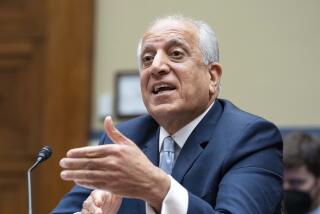Special envoy Holbrooke undergoes heart surgery
- Share via
Reporting from Washington — Richard C. Holbrooke, the U.S. special envoy to Afghanistan and Pakistan, was in critical condition Saturday after undergoing surgery to repair a tear in his aorta, a State Department spokesman said.
Holbrooke, 69, underwent surgery Saturday morning at George Washington University Hospital after becoming ill at the State Department the day before, spokesman Philip J. Crowley said.
President Obama issued a statement Saturday evening saying he had spoken to Holbrooke’s wife, author Kati Marton, and told her that he and first lady Michelle Obama were “praying for Richard.”
Obama saluted Holbrooke as a “towering figure in American foreign policy … who has won the admiration of the American people and people around the world.”
Just days into office, Obama named Holbrooke the special representative in Afghanistan and Pakistan, making him the point man in the administration’s bid to forge a policy to stabilize the two fragile states. The hard-charging diplomat nicknamed “the Bulldozer” is best known for helping broker the 1995 Dayton peace accords that ended the war in Bosnia-Herzegovina.
Duke Cameron, chief of surgery at Johns Hopkins Hospital in Baltimore, said in an interview Saturday that a tear in the aorta is “extremely serious,” the most life-threatening emergency involving the heart’s major artery.
He said more than 90% of people who suffer aortic tears die, most within two days of the tear. But if a patient is near a good hospital with an open-heart surgery team available, the chances of pulling through are about 80%, he said.
Key is whether the aortic tear triggers another problem, such as a heart attack or stroke, he said.
If all goes well after surgery, patients generally need three to four months to recover, he said, but if there are other problems, it could take years. And in some cases, Cameron said, “people were never quite what they were before.”
The American Heart Assn. says an aortic tear occurs when the inner layer of the artery wall splits open, or dissects. The condition, more common in men, causes sudden chest pain often described as very severe and is associated with cold sweat, it says.
Secretary of State Hillary Rodham Clinton visited Holbrooke on Friday and Saturday at George Washington University Hospital, her spokesman Philippe Reines said.
Holbrooke was Clinton’s chief foreign policy advisor during the 2008 presidential primary campaign, before switching over to advise Obama in the general election campaign.
In announcing Holbrooke’s appointment, Clinton had said conditions in Afghanistan, where U.S.-led forces have battled the Taliban since late 2001, required an integrated strategy involving neighboring Pakistan. She said Holbrooke would work with the U.S. Agency for International Development, the State and Defense Departments, the National Security Council, NATO allies and others.
Holbrooke, who joined the Foreign Service 38 years ago, was U.S. ambassador to the United Nations under President Clinton in 1999-2001.
His most high-profile success came earlier in the Clinton administration as assistant secretary of State for Europe in 1994-96, when he was the architect of the accords that ended the Bosnian war that had seen brutal ethnic cleansing by Serbian forces. Holbrooke later became President Clinton’s special envoy to Bosnia and Kosovo and later to Cyprus.
More to Read
Sign up for Essential California
The most important California stories and recommendations in your inbox every morning.
You may occasionally receive promotional content from the Los Angeles Times.












